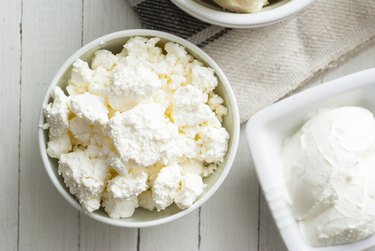
Ricotta cheese is a commonly-available cheese used as a filling for lasagna and stuffed shells, as well as a pizza topping, and even as a filling for Italian desserts such as cannoli. It is made from whey — a cheese by-product from cheeses like mozzarella and provolone. You can also make ricotta cheese at home by separating the whey from whole milk. Ricotta cheese nutrition is a mixed bag as far as its healthfulness goes. It is quite fattening and high in calories; however, it has much nutritional value from the vitamins and minerals it contains.
Tip
When it comes to health, ricotta cheese has its pluses and minuses. Choose part-skim or fat-free ricotta for less calories and lower fat content.
Video of the Day
Ricotta Cheese Calories
A 1-cup serving of whole milk ricotta cheese contains 428 calories and 32 grams of fat. The majority of that fat — 20 grams — comes from saturated fat, the type of fat that can wreak havoc with your blood cholesterol levels and lead to an increased risk of heart disease. There are part-skim and fat-free ricotta varieties available, although the texture of the ricotta, normally creamy and sweet, sometimes suffers. Part-skim ricotta has less fat and calories per serving, although not significantly so as 1 cup has 339 calories and 19.5 grams of fat. Fat-free ricotta contains 160 calories and no fat.
Video of the Day
Saturated Fat and Cholesterol
As with most cheeses, ricotta is high in fat. The majority of the fat in whole milk ricotta cheese is saturated. According to a study published in 2018 by PLoS One, eating a diet high in saturated fat increases risk of cardiovascular disease by raising blood cholesterol levels.
One serving of ricotta cheese contains 126 mg of cholesterol. Part-skim ricotta has 76 mg of cholesterol per serving, and fat-free ricotta contains 60 mg per serving. According to the Office of Disease Prevention and Health Promotion's 2015-2020 dietary guidelines, the body produces produces the amount of cholesterol it needs, and it is not necessary to obtain cholesterol through foods. While cholesterol in food doesn't necessarily raise your blood cholesterol levels, if you have high a history of high cholesterol you may want to talk to your doctor about whether you should limit your intake of foods high in this fat. When it comes to heart health and dairy foods, the American Heart Association says to choose low-fat or nonfat options.
Carbohydrates and Protein
Eat a serving of ricotta cheese, and you will take in 7.5 g of carbohydrates and 27.7 g of protein. Both of these macronutrients contribute to your energy needs. Fat-free ricotta provides you with slightly less protein and more carbohydrates than whole milk ricotta; part-skim ricotta has approximately the same amount of protein but more carbohydrates.
Ricotta Cheese Nutrition
Including ricotta cheese in your diet boosts your calcium intake; one serving provides you 51 percent of the daily value. Part-skim ricotta may contain slightly more, but fat-free ricotta contains far less. A serving of ricotta cheese will also provide you with 39 percent of the daily value of phosphorus, 28 percent of riboflavin, 22 percent of vitamin A, 19 percent of zinc and 14 percent of the daily value of vitamin B-12. Amounts may vary in part-skim and fat-free varieties.
Ricotta Sodium Content
Ricotta cheese contains 206.6 mg of sodium. Part-skim and fat-free varieties of this cheese contains significantly more sodium, with fat-free ricotta containing approximately 600 mg per 1-cup serving. The American Heart Association recommends consuming 1,500 mg per day or less.
- Food.com: Ricotta Cheese
- FitBit: Ricotta Cheese, Whole Milk
- FitBit: Ricotta Cheese, Part Skim
- FitBit: Fat Free Ricotta
- PLoS One: Changes in Markers for Cardio-Metabolic Disease Risk After only 1-2 Weeks of a High Saturated Fat Diet in Overweight Adults
- Harvard School of Public Health: New Dietary Guidelines Remove Restriction on Total Fat and Set Limit for Added Sugars but Censor Conclusions of the Scientific Advisory Committee
- Office of Disease Prevention and Health Promotion: 2015-2020 Dietary Guidelines
- McKinley Health Center: Macronutrients: the Importance of Carbohydrate, Protein, and Fat
- U.S. Centers for Disease Control and Prevention: Americans Consume Too Much Sodium (Salt)
- American Heart Association: Sodium (Salt or Sodium Chloride)